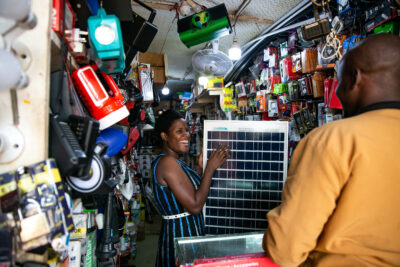
Kizia Janet, an entrepreneur selling solar-powered products in Kyenjojo, Uganda.
On International Women’s Day, we celebrate the impact women entrepreneurs have on the clean energy transition, overcoming systemic challenges and biases around the world.
—
Clean energy solutions – the very ones that can help address the impacts of climate change – should not be held back by systemic barriers. Yet women entrepreneurs continue to face disproportionate challenges in funding and scaling their clean energy businesses. In fact, only 3% of global venture capital goes to companies founded solely by women, and just 15% of investors in the clean energy space are women.
These data are not just mere numbers on equitable representation: they speak about missed economic and societal potential. For example, the International Monetary Fund states that only 6% of women in advanced economies hold green jobs, whereas more than 20% of employed men work in this sector. The share of women in green jobs is even lower in emerging markets and developing economies.
Tackling this gender gap is crucial for both economic growth and environmental sustainability. According to the IMF, nations with a higher proportion of STEM-educated workers and robust gender equity policies tend to experience greater reductions in greenhouse gas emissions when implementing climate policies. In the countries where NEX works, we see daily that women are developing groundbreaking clean energy solutions, yet they often struggle to access the same resources, visibility, and agency as their male counterparts.
On International Women’s Day, it’s not enough to simply celebrate women founders for the sake of diversity—we must recognize their ingenuity, resilience, and the transformative impact they’re making in the clean energy sector. These entrepreneurs aren’t just numbers on an inclusion story; they’re building tangible clean energy solutions that reflect the needs of their communities.
The question is, how can they break these barriers and scale their solutions?
What we’re doing
At New Energy Nexus, we’re committed to partnering with women-led startups and businesses, and facilitating access to the resources they need to grow. In 2023, we backed 1,100 women entrepreneurs—40% of the total founders we supported—toward the goal of building a more inclusive clean energy sector. This is far from parity but a huge step in the right direction.
Through our global network, we connect women entrepreneurs not only to capital and mentorship but also to a community of fellow women founders. We provide funding through New Energy Nexus Ventures and partnerships with alternative financing vehicles worldwide while offering training and mentorship through our accelerator and incubator programs across multiple countries.
Women leading the way
This support only elevates the already impactful work these women entrepreneurs are doing. From energy efficiency solutions to improving energy access in off-grid communities, women have their fingerprints all over the global clean energy sector. Here are a few examples across the world:
Community Energy Labs (California, USA)
Community Energy Labs (CEL) is pioneering a low-cost, grid-interactive building control platform that autonomously optimizes energy use, pricing, and comfort. Their innovative solution minimizes the setup and maintenance burden for controls professionals and building operators, making it ideal for K-12 schools, municipalities, and small to mid-sized buildings.
At the helm of CEL is Tanya Barham, a visionary entrepreneur and CEO who is revolutionizing energy management through community-driven, sustainable solutions. With a deep passion for technology and sustainability, Tanya has established CEL as a leader in smart energy systems, empowering communities to reduce costs, lower carbon footprints, and optimize energy efficiency.
Beyond her technical expertise, Tanya is a dedicated advocate for diversity and inclusion in STEM and entrepreneurship
“CalSEED has really enabled our customer focus in a way that I think a lot of technology and R&D organizations don’t necessarily do. So we’ve appreciated that a lot. Also just good people. They’re really just trying to enable you to give you the resources to the network, the opportunities, the visibility to allow you to test your new idea and to allow it to flourish,” said Tanya Barham.
Solar Run Energy (China)
Solar Run Energy is not only a thriving business but also a lifeline for off-grid communities in several countries in Africa, providing solar-powered solutions to millions without electricity.
Founder Xia (Susan) Li grew up in rural China, where she relied on kerosene lamps for light. That firsthand experience shaped her understanding of energy poverty and reinforced her commitment to creating sustainable solutions.
“Today, many girls still have to give up the opportunity to study because they have to fetch water during the day,” Li said. “If there is a light at night, at least they still have a chance to study and read.”
New Energy Nexus China has supported Solar Run Energy, helping scale its impact with access to networks and international markets.
Agrivijay (India)
Co-founded by Shobha Chanchlani, Agrivijay is India’s first curated marketplace for renewable energy products, specifically for farmers and rural households. They have multiple ‘Renewable Energy Stores’ that act as a one-stop shop for solar, biogas, thermal, wind, and electric products.
An alumni of the Women in Energy program we run with Climate Collective, which support the growth of women-led early-stage startups in India, Agrivijay has since established 11 new Renewable Energy Stores and has expanded in the states of Telangana and Andhra Pradesh.
“We’re honored and glad to be part of [New Energy Nexus’] accelerator program, which has helped shape us as an organization with a vision to empower farmers and rural households to fight climate change,” said Chanchlani.
Magi Farm (Indonesia)
The island of Bali in Indonesia has a waste problem, with a large component being food scraps. Led by Indonesian entrepreneur Ima Rida, Magi Farm uses Black Soldier Fly larvae to transform food waste into nutrient-rich compost.
This method not only cuts harmful methane emissions, but also regenerates the environment and opens up possibilities for sustainable tourism.
Magi Farm launched its pioneering, community-focused pilot project with support and a grant from NEX Indonesia.
“Maybe there are Balinese women out there feeling the way I did when I started building my business,” Rida said. “Sometimes the challenge lies in societal expectations: balancing running a business, finding personal time, and participating in traditional community activities.”
GAIA Corp (Philippines)
Women-led startup GAIA Corp is tackling the challenge of heat management in buildings—a critical issue in the Philippines, where rising temperatures are driving up cooling-related energy consumption.
Their insulation technology, The CoolRoof Project, reduces heat absorption in buildings, improving resilience while cutting energy costs.
Operating in a male-dominated industry, founder Eva Lisa Adoremos has faced challenges working primarily with engineers. She overcame this by continuously expanding her expertise through education.
Eva and GAIA Corp are alumni of NEX Philippines’ Startup Acceleration Program, where she gained valuable insights into the administrative side of running a clean energy startup and joined a global network of industry peers.
“I think my role, being a woman in this space, is to become an instrument of promoting equal opportunities for other women who want to be part of this sector,” Adoremos said.

Atchara Poomee, Founder and CEO of PAC Corporation. Photo from PAC Corporation
PAC Corporation (Thailand)
Just a short flight away from the Philippines, Thailand also experiences bouts of extreme heat, partly quelled by air conditioning units. However, emissions from these units contribute to climate change, creating a cycle of rising temperatures and increased energy demand.
PAC Corporation is tackling this issue by producing energy-efficient air conditioning units and water heaters that recycle waste heat, reducing both energy costs and environmental impact.
Founder and CEO Atchara Poomee is also a strong advocate for gender equality, mentoring entrepreneurs of all genders and using her platform to inspire more women to enter the sector.
“I would like them to believe that they are capable, and, regardless of gender, we can succeed if we are determined,” she shared in a UN Women article.
Through NEX Thailand’s Decarbonizing Thailand Sandbox, PAC Corporation was matched with corporate partner B. Grimm, helping scale its solutions for a more sustainable future.
Uganda – Local Organizations and Entrepreneurs
With 60 percent of the population still lacking access to electricity, our Uganda program focuses on supporting local organizations that understand the unique challenges of off-grid communities. We’ve provided funding to groups like Utopia, a faith-based organization empowering rural women entrepreneurs to build clean energy businesses in the Kyenjojo district.
A majority of the entrepreneurs we’re supporting in the country are women, and 70 percent of the jobs created by our programs were taken by women as well.
One such entrepreneur is Kizia Janet, whose solar lantern and panel business is now thriving. Beyond securing a steady income, she is helping her community transition to sustainable energy, improving both quality of life and local economic growth.

Nguyễn Thị Thu Hằng pitching Wiibike on “Shark Tank Vietnam.” Photo from Shark Tank Vietnam
Wiibike (Vietnam)
Nguyễn Thị Thu Hằng founded Wiibike, Vietnam’s first locally made e-bike, to promote both a healthier lifestyle and a shift toward green transportation.
Her journey began as a new mother concerned about air pollution’s impact on her child’s future. What started as a personal mission has grown into a thriving business, with over 1,000 e-bikes sold and an ambitious goal of reaching 2 million units by 2030. Hằng even pitched Wiibike on Shark Tank Vietnam, showcasing the potential of sustainable mobility.
Wiibike participated in New Energy Nexus Vietnam’s Cohort 2 program, where the team refined their business model, gained insights into fundraising, and built strategic partnerships to scale their impact.
—
From California to Ho Chi Minh City, these women are demonstrating that when diverse founders have the right support, they don’t just succeed—they redefine industries, drive innovation, and accelerate the clean energy transition.
Their businesses are not only creating jobs and cutting emissions, but also highlighting that women entrepreneurship holds the key to an inclusive clean energy future.
Be part of our movement for a more equitable clean energy transition. If you’re an entrepreneur, check out how our programs can accelerate your growth here. Or if you’re a donor or potential partner that wants to scale your impact, let’s talk!